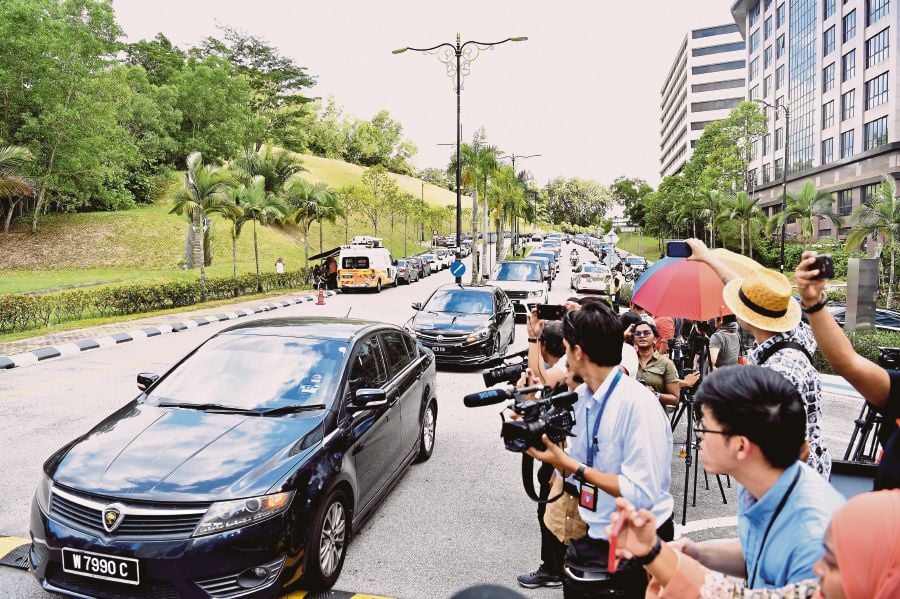‘Malaysia will emerge from political crisis stronger’

“Before this, he depended on the party hierarchy to distribute ministerial posts; he had no choice but to accept the faults of his ministers, but now he can stamp his authority.’
(NST) – Even as a cloud of uncertainty continues to cast a shadow over Malaysia’s political landscape, observers remain confident that the outcome will see the nation emerge with a stronger government and more efficient cabinet in place.
Analysts believe that 94-year-old Tun Dr Mahathir Mohamad, who took the country by surprise by announcing his resignation as prime minister on Monday, and his subsequent reappointment as interim prime minister, is laying the groundwork for a shake-up of the political system.
They believe that while Dr Mahathir could eventually become the country’s eighth prime minister, it will come with a series of changes geared towards a more efficient running of the government.
Geopolitical expert Azmi Hassan said Dr Mahathir would be looking to have a free rein in choosing the candidates in the so-called unity government, and purge those deemed deadweight or problematic.
“Before this, he depended on the party hierarchy to distribute ministerial posts; he had no choice but to accept the faults of his ministers, but now he can stamp his authority.
“I believe that when he becomes the eighth PM, he will have a free hand to elect who he thinks deserve to be ministers, while taking into account the people’s responses and grouses on the former ministers.”

On what Dr Mahathir’s endgame would look like, Azmi said the statesman was likely to end internal politics and push on to the daily business of running the government — something he had managed to do with relative ease during his first tenure as prime minister.
Azmi also did not rule out the possibility that the resignation was a tactical manoeuvre on the veteran politician’s part.
“By quitting as PM and Parti Pribumi Bersatu Malaysia chairman, he demonstrated that he was not interested in holding the PM’s post forever.
“He is showing that he is keeping his promise and, as such, is the correct person to be the eighth PM.”
On the prospect of a unity government, Azmi said while it was feasible for now, it was unlikely to be in place all the way until the next election.
“The unity government will be very fragile as it will be composed of the government and the opposition. I don’t think Umno and Pas will work hand in hand with DAP. It is crucial to include PKR and DAP, at least for now.
“However, a unity government can last long enough for things to stabilise and cool down before an election is called and the people can give their mandate to a new government.”
On the possibility of snap polls being called, Azmi said it was unlikely.
“A new government is likely to be formed in the next couple of days. It can go either way, but I am sure that whichever party forms the government, Dr Mahathir will be leading it.”
Political analyst Dr Mohd Azizuddin Mohd Sani, however, believes that a unity government could be the answer, judging from the Barisan Nasional model after the 1969 race riots, where all parties were involved, save DAP.
He said the formula of having individuals selected by the prime minister or president had worked well, even in Indonesia. He cited President Joko Widodo appointing his political opponent, Lieutenant-General Prabowo Subianto as the defence minister in his second-term cabinet.
The decision was seen as a landmark move in the world’s third largest democracy.
Azizuddin also believes that the door towards the premiership has not been closed entirely to PKR president Datuk Seri Anwar Ibrahim.
“I believe that the offer may still be on the table. However, it will happen only with Dr Mahathir’s blessings.
“He may nominate Anwar to the Yang di-Pertuan Agong to take over in a number of days or weeks.
“However, Anwar, upon seeing the level of support for Dr Mahathir and seats pledged to him in Parliament, may concede to let him stay on until the Asia-Pacific Economic Cooperation has been wrapped up. This crisis has rattled him.
“But if people are still unhappy, they can call for a vote of no-confidence in Parliament when it convenes in March. As to whether they can get the numbers to oust Dr Mahathir is another question.”
Azizuddin said either way, regardless of camps, support was swinging in Dr Mahathir’s favour.
“He is redrawing battlelines in his quiet time now.”

